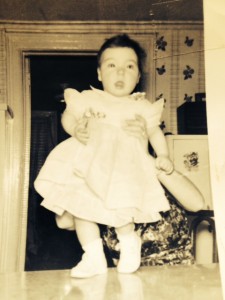As a girl, I watched my mother, Anna, pay bills at our kitchen table. The vinyl tablecloth, a neat stack of bills with their envelopes and stamps nearby and a pile of money orders she’d sign in her neat, flowery penmanship.

I learned about money from my mother—how to be afraid of not having enough and how to stretch a dollar. Once I heard a commercial jingle for HFC Finance, a well-known lending company at the time, on the radio, its song punctuating the company name with the strikes of a xylophone. I said to my mom, “Why don’t you call them, mom, they’re giving away money.” She laughed. “They don’t give you money for nothing,” she said.
When my parents bought our house in Brooklyn, a big deal for my Depression-era folks, she went to work nights at a candy factory to help pay the mortgage. “I told your father,” she said, “how else are we going to pay our bills if I don’t go to work?” And my father told me later when I was an adult, “If it wasn’t for your mother, we’d have nothing. I would’ve spent it all.” My mother had a clear-eyed focus on our family finances.
My mother was an exceptional role model when it came to money and so many other things. Whether I chose to absorb those lessons was another matter. In fact, I discarded her simple “don’t spend more than you have” approach in place of a freewheeling “ain’t no stopping me from having what I want” recklessness. But eventually, when the ice water was thrown in my intent-on-denial face, my mother’s common sense rallied to my side like a long-lost friend. The foundation my mom had laid was there under all the debris. All I had to do was sweep the junk aside and allow her guidance to take over. Just like in the photo of me at age 1, where she’s propping me up, hidden, behind the scenes.
Though my mom has been gone for almost 15 years now, she left a legacy of care. Her lessons of strength and common sense had been there for me all along. I just needed to listen to my still, small voice inside me right alongside hers.
Tell me what your mom taught you about money and life.





